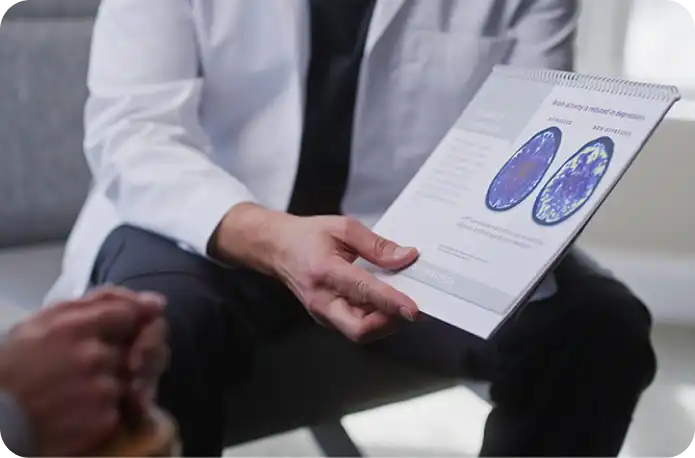At Blossom TMS clinic, we are dedicated to offering holistic mental health services that cater to the diverse needs of our clients. Depression, anxiety, and other mental health conditions can severely affect daily life, making it challenging to perform basic tasks or maintain relationships.
We understand the unique struggles that each person faces, and we are committed to providing compassionate, effective care. We offer Transcranial Magnetic Stimulation (TMS) therapy, which is FDA-cleared for treating Major Depressive Disorder (MDD) and obsessive-compulsive disorder (OCD), among other mental health disorders.
Major Depressive Disorder (MDD) is a serious mental health condition characterized by persistent sadness, loss of interest in daily activities, fatigue, and emotional distress. It affects mood, cognition, and physical health, often interfering with work, relationships, and overall well-being. While therapy and medication are standard treatments, many individuals do not fully respond, requiring alternative approaches.
Transcranial Magnetic Stimulation (TMS) is a non-invasive therapy that uses electromagnetic pulses to stimulate underactive areas of the brain responsible for mood regulation. It is FDA-approved for treatment-resistant depression and provides a promising alternative for individuals who have not benefited from traditional antidepressants or therapy.

Anxiety disorders are increasingly common and can range from generalized anxiety to panic attacks and social anxiety. Chronic anxiety can be overwhelming and exhausting, often leading to difficulties in work, school, or relationships.
Understanding Anxiety and Its Impact
Anxiety is a natural response to stress, but when persistent and overwhelming, it can develop into a disorder that disrupts daily life, causing emotional, behavioral, and physical distress.
Anxiety vs. Anxiety Disorders: Key Differences
Anxiety is a temporary and natural response to stress, preparing the body for action.
Anxiety Disorders involve chronic, excessive fear and worry that interfere with daily functioning and often lead to physical symptoms like nausea and elevated heart rate.

Anxiety disorders are increasingly common and can range from generalized anxiety to panic attacks and social anxiety. Chronic anxiety can be overwhelming and exhausting, often leading to difficulties in work, school, or relationships.
Understanding Anxiety and Its Impact
Anxiety is a natural response to stress, but when persistent and overwhelming, it can develop into a disorder that disrupts daily life, causing emotional, behavioral, and physical distress.
Anxiety vs. Anxiety Disorders: Key Differences
Anxiety is a temporary and natural response to stress, preparing the body for action.
Anxiety Disorders involve chronic, excessive fear and worry that interfere with daily functioning and often lead to physical symptoms like nausea and elevated heart rate.

Obsessive-Compulsive Disorder (OCD) is a chronic mental health condition characterized by intrusive, unwanted thoughts (obsessions) and repetitive behaviors or rituals (compulsions) aimed at reducing distress. While OCD can vary in severity, it often interferes with daily life, relationships, and overall well-being.
Transcranial Magnetic Stimulation (TMS) is a non-invasive therapy that uses electromagnetic pulses to target brain regions associated with OCD. It is typically considered when medications and traditional therapies, such as Cognitive Behavioral Therapy (CBT) and Selective Serotonin Reuptake Inhibitors (SSRIs), fail to provide sufficient relief. The FDA has approved TMS for treatment-resistant OCD, offering a new avenue for symptom reduction. TMS therapy has shown positive outcomes in reducing the frequency and intensity of obsessive thoughts and compulsive behaviors.


Obsessive-Compulsive Disorder (OCD) is a chronic mental health condition characterized by intrusive, unwanted thoughts (obsessions) and repetitive behaviors or rituals (compulsions) aimed at reducing distress. While OCD can vary in severity, it often interferes with daily life, relationships, and overall well-being.
Transcranial Magnetic Stimulation (TMS) is a non-invasive therapy that uses electromagnetic pulses to target brain regions associated with OCD. It is typically considered when medications and traditional therapies, such as Cognitive Behavioral Therapy (CBT) and Selective Serotonin Reuptake Inhibitors (SSRIs), fail to provide sufficient relief. The FDA has approved TMS for treatment-resistant OCD, offering a new avenue for symptom reduction. TMS therapy has shown positive outcomes in reducing the frequency and intensity of obsessive thoughts and compulsive behaviors.
Attention-Deficit/Hyperactivity Disorder (ADHD) is a neurodevelopmental condition characterized by persistent inattention, impulsivity, and hyperactivity. It affects both children and adults, often interfering with academic, professional, and personal life. While medications and behavioral therapies are standard treatments, some individuals do not respond well to these options, leading to the need for alternative approaches.
Transcranial Magnetic Stimulation (TMS) is a non-invasive therapy that uses electromagnetic pulses to stimulate brain regions involved in focus, impulse control, and executive functioning. It is an emerging treatment for ADHD, particularly for those who do not tolerate or benefit from traditional medications like stimulants (e.g., Adderall, Ritalin). TMS therapy has been shown to help individuals with ADHD improve focus, attention, and self-regulation without the side effects of medication.

Attention-Deficit/Hyperactivity Disorder (ADHD) is a neurodevelopmental condition characterized by persistent inattention, impulsivity, and hyperactivity. It affects both children and adults, often interfering with academic, professional, and personal life. While medications and behavioral therapies are standard treatments, some individuals do not respond well to these options, leading to the need for alternative approaches.
Transcranial Magnetic Stimulation (TMS) is a non-invasive therapy that uses electromagnetic pulses to stimulate brain regions involved in focus, impulse control, and executive functioning. It is an emerging treatment for ADHD, particularly for those who do not tolerate or benefit from traditional medications like stimulants (e.g., Adderall, Ritalin). TMS therapy has been shown to help individuals with ADHD improve focus, attention, and self-regulation without the side effects of medication.

Past trauma and childhood abuse can leave lasting emotional scars, resulting in difficulties with trust, relationships, and emotional regulation. These experiences can contribute to a wide range of mental health issues, including depression, anxiety, and PTSD.
The Impact of PTSD
Trauma can leave lasting psychological scars, and many individuals struggle with persistent symptoms like anxiety, depression, nightmares, and flashbacks. In severe cases, PTSD can lead to emotional detachment and loss of interest in daily life.
Identifying PTSD Triggers
PTSD develops after exposure to distressing events, including:
Both emotional and physical trauma can contribute to PTSD.


Past trauma and childhood abuse can leave lasting emotional scars, resulting in difficulties with trust, relationships, and emotional regulation. These experiences can contribute to a wide range of mental health issues, including depression, anxiety, and PTSD.
The Impact of PTSD
Trauma can leave lasting psychological scars, and many individuals struggle with persistent symptoms like anxiety, depression, nightmares, and flashbacks. In severe cases, PTSD can lead to emotional detachment and loss of interest in daily life.
Identifying PTSD Triggers
PTSD develops after exposure to distressing events, including:
Both emotional and physical trauma can contribute to PTSD.
Eating disorders are serious mental health conditions characterized by disordered eating behaviors, distressing thoughts about food, body image concerns, and often co-occurring anxiety or depression. Common types include anorexia nervosa (AN), bulimia nervosa (BN), and binge-eating disorder (BED). These conditions can significantly impact physical health, emotional well-being, and daily life. While traditional treatments like therapy, medication, and nutritional counseling are effective for many, some individuals do not fully respond, requiring alternative approaches.
How TMS Helps Eating Disorders
Transcranial Magnetic Stimulation (TMS) is a non-invasive therapy that uses electromagnetic pulses to stimulate brain regions associated with appetite regulation, impulse control, and emotional processing. It is emerging as a promising option for individuals who have not responded to conventional treatments for eating disorders.

Eating disorders are serious mental health conditions characterized by disordered eating behaviors, distressing thoughts about food, body image concerns, and often co-occurring anxiety or depression. Common types include anorexia nervosa (AN), bulimia nervosa (BN), and binge-eating disorder (BED). These conditions can significantly impact physical health, emotional well-being, and daily life. While traditional treatments like therapy, medication, and nutritional counseling are effective for many, some individuals do not fully respond, requiring alternative approaches.
How TMS Helps Eating Disorders
Transcranial Magnetic Stimulation (TMS) is a non-invasive therapy that uses electromagnetic pulses to stimulate brain regions associated with appetite regulation, impulse control, and emotional processing. It is emerging as a promising option for individuals who have not responded to conventional treatments for eating disorders.

Sleep is essential for mental and physical health, with deprivation linked to issues like high blood sugar, weight gain, depression, and cognitive impairments. Insufficient sleep also increases the risk of chronic conditions such as heart disease, diabetes, and mental health disorders.
Chronic insomnia treatment typically includes cognitive behavioral therapy for insomnia (CBT-I) and medication (e.g., antidepressants or sleeping pills). However, these medications often cause side effects like dizziness, fatigue, and weight gain, leading some patients to discontinue use.


Sleep is essential for mental and physical health, with deprivation linked to issues like high blood sugar, weight gain, depression, and cognitive impairments. Insufficient sleep also increases the risk of chronic conditions such as heart disease, diabetes, and mental health disorders.
Chronic insomnia treatment typically includes cognitive behavioral therapy for insomnia (CBT-I) and medication (e.g., antidepressants or sleeping pills). However, these medications often cause side effects like dizziness, fatigue, and weight gain, leading some patients to discontinue use.
Addiction is a chronic brain disorder that disrupts motivation, reward, and memory, leading to compulsive substance use despite harmful consequences. It affects health, relationships, and overall well-being.
Common Signs of Addiction
Addiction symptoms vary but often include:
Treatment Approaches for Addiction
Effective treatment involves recognizing the issue and utilizing therapy, detox, medication, and support groups. TMS therapy is also an option for managing cravings and stabilizing mood.

Addiction is a chronic brain disorder that disrupts motivation, reward, and memory, leading to compulsive substance use despite harmful consequences. It affects health, relationships, and overall well-being.
Common Signs of Addiction
Addiction symptoms vary but often include:
Treatment Approaches for Addiction
Effective treatment involves recognizing the issue and utilizing therapy, detox, medication, and support groups. TMS therapy is also an option for managing cravings and stabilizing mood.


We believe in treating the whole person, not just the symptoms. Our treatment approach combines advanced therapies like TMS with other forms of care, ensuring that each individual receives personalized, comprehensive support. We prioritize collaboration with other healthcare providers and professionals to deliver the best possible outcomes for our clients.
While TMS therapy is an excellent alternative for many people who have not found relief through medication, some individuals may benefit from a combination of TMS and other treatments, including medication. Our team offers medication management services to ensure that you are receiving the most effective treatment for your condition.
We also provide ongoing follow-up care to monitor your progress and adjust your treatment plan as necessary. Your mental health journey is unique, and we are committed to supporting you every step of the way.
We believe in treating the whole person, not just the symptoms. Our treatment approach combines advanced therapies like TMS with other forms of care, ensuring that each individual receives personalized, comprehensive support. We prioritize collaboration with other healthcare providers and professionals to deliver the best possible outcomes for our clients.
While TMS therapy is an excellent alternative for many people who have not found relief through medication, some individuals may benefit from a combination of TMS and other treatments, including medication. Our team offers medication management services to ensure that you are receiving the most effective treatment for your condition.
We also provide ongoing follow-up care to monitor your progress and adjust your treatment plan as necessary. Your mental health journey is unique, and we are committed to supporting you every step of the way.
